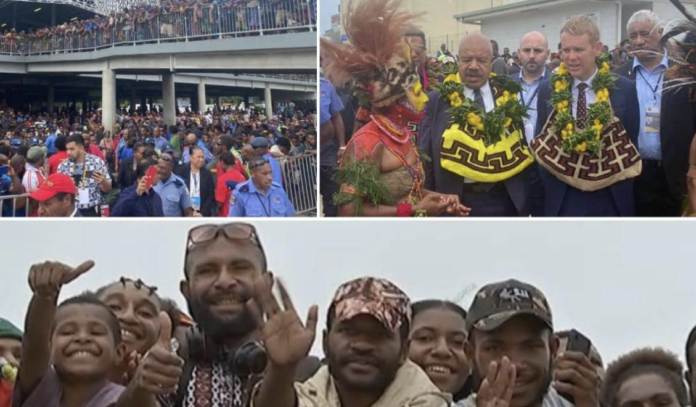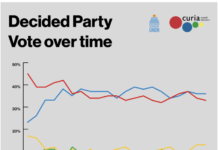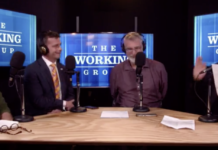Chris Hipkins is blazing his way through New Zealand’s foreign policy.
The New Zealand Prime Minister’s fast-but-furious visit to Papua New Guinea this week – which saw Hipkins spend just 23 hours in Port Moresby, the PNG capital – was the PM’s fourth such rapid international trip since he took office.
But after two quick visits to Australia and one to the United Kingdom, this was Hipkins’ first foray into the Pacific.
Moreover, Monday’s trip to PNG put the Prime Minister at the heart of the new ‘Great Game’ for control of the Pacific. And in the geopolitical battle between the US and China, New Zealand is increasingly being asked to pick a side.
Hipkins responded to yet another new superpower security deal – this time between the United States and Papua New Guinea – by saying that New Zealand did not support the ‘militarisation of the Pacific’.
At first blush, this might seem like some surprising, even eviscerating criticism of the US, an increasingly close partner of New Zealand.
But Hipkins went on to argue rather unconvincingly that ‘having a military presence doesn’t necessarily signify militarisation’.
Effectively, this was Hipkins giving Wellington’s green light to Washington’s new pact.
It is an agreement that Beijing has already sharply criticised as ‘geopolitical games’.
To some extent, the PM’s linguistic gymnastics are only to be expected, given New Zealand’s gradually more US-friendly approach to foreign policy that has unfolded under the leadership of both Chris Hipkins and his immediate predecessor, Jacinda Ardern.
However, ambiguity remains over just how far this new approach will go.
Of late, Hipkins has been dialling down expectations set by his defence minister, Andrew Little, that New Zealand is considering joining the ‘second pillar’ of the ultra-hawkish AUKUS arrangements.
These currently link Australia, the United Kingdom and United States, but other partners are being sought.
In response to media questioning on New Zealand’s potential role in AUKUS on Monday, the PM would only say ‘that’s not clear’.
But it can be assumed that US Secretary of State Antony Blinken privately put some AUKUS pressure on New Zealand when he met with Chris Hipkins on the sidelines of the summit in Papua New Guinea.
Another major highlight of Hipkins’ one-day mission to Port Moresby was a chance for his first meeting with Narendra Modi, the Prime Minister of India.
Positively, Modi tweeted of an ‘excellent meeting’ with Hipkins, adding that the pair had discussed ‘how to improve cultural and commercial linkages’.
Wellington has playing catch-up in its relationship with New Delhi ever since India’s external affairs minister, Dr. Subrahmanyam Jaishankar, was the subject of a rather underwhelming reception during his visit to New Zealand in October last year.
In response to the criticism, Nanaia Mahuta, New Zealand’s foreign minister, flew to India in February for her first overseas trip of 2023.
In the meantime, a pledge by Hipkins’ main political rival – opposition National Party leader Christopher Luxon – to make the relationship with India a priority has probably also focused minds in Hipkins’ Labour Government.
While any progress is to be welcomed, New Zealand still lags far behind its bigger neighbour when it comes to ties with India. Following his stop in Port Moresby, Modi is heading to Australia for talks with his counterpart Anthony Albanese and a sell-out address to 20,000 people at Sydney’s Olympic Park.
Although Jacinda Ardern issued a public invitation to Narendra Modi to visit New Zealand, the Indian PM has made no plans for a side-trip to Wellington while on his rare visit Down Under.
If Hipkins needed any further encouragement of India’s importance, he needed only to listen to James Marape, Papua New Guinea’s Prime Minister.
On Monday, Marape was effusive in his praise of Modi during his counterpart’s visit to Papua New Guinea, describing him as ‘the leader of the Global South’. Calling on Modi to continue to speak up for countries such as PNG in meetings with superpowers, Marape vividly depicted developing countries as the ‘victims of global power play’.
The remarks by Marape will be a salutary lesson for some of the bigger Pacific players.
It is a warning that countries such as Papua New Guinea expect to be treated with genuine respect and interest, rather than as mere geopolitical pawns.
Indeed, the PNG PM’s comments contrasted starkly with the ostensibly inclusive, yet ultimately exclusionary ‘Pacific family’ language that Canberra and Wellington have frequently deployed over the past year.
Above all, Narendra Modi’s presence was a reminder that Port Moresby has options.
And to be fair, New Zealand has been putting in some effort with PNG – despite its location in Melanesia, further away from New Zealand’s traditional Polynesian heartland. Well before Hipkins headed to Port Moresby, Mahuta made a special trip to Papua New Guinea in September last year.
That visit came in the context of the Pacific travel push by Western leaders following the Solomon Islands-China security deal signed in early 2022.
But the same cannot be said for a partnership between New Zealand and Papua New Guinea signed in 2021 – or a visit by James Marape to Wellington just prior to coronavirus lockdowns in February 2020.
The recent appointment of Peter Zwart as New Zealand’s new High Commissioner to Papua New Guinea provides further justification for some optimism.
The job is Zwart’s first ambassadorial-level position, but Wellington’s new man in Port Moresby brings a strong track record in Pacific development. He has also previously been posted to China. Prior to becoming a diplomat, Zwart was the international programme manager for the New Zealand arm of Catholic aid agency Caritas.
In the current geopolitical context, Zwart will need to draw upon all of his previous experience while representing New Zealand’s interests.
Whatever happens, Port Moresby will remain a key regional capital on Wellington’s radar.
Chris Hipkins has now had his first taste of the Pacific as New Zealand’s Prime Minister.
With under 24 hours on the ground, it was the definition of a flying visit.
But it was just the beginning.
Geoffrey Miller is the Democracy Project’s geopolitical analyst and writes on current New Zealand foreign policy and related geopolitical issues. He has lived in Germany and the Middle East and is a learner of Arabic and Russian. He is currently working on a PhD on New Zealand’s relations with the Gulf states.





Great blog, look forward to hearing more.
Thanks for the insights.
I appreciate the article.
Informative article thank you.
Good to see Labour heeding the advice from National’s Luxon.
Well Hipkins is walking the line, the yanks are ramping up tension and putting the hard word on all and sundry in their “China offensive” but NZ has latterly has had a slightly better record with relations with Pacific neighbours including apologies to Samoa.
Positive engagement and mutually beneficial relations are the way to go rather than joining US imperialist power blocs and ally herding efforts.
However…
–Australia has long either ignored or lorded it over its Pacific neighbours, and used several of them as squalid detainment camps for refugees, migrants, prisoners and activists.
–PNG is pretty close to a failed state, so the yanks are obviously only the least bit interested in it for Military/Strategic reasons.
–The US could always start with helping sort out the long running hideous situation in West Papua…dreams are free…but of course they won’t, anymore that they sort out injustice anywhere unless there is a pay day for them.
–Pacific nations know exactly US Imperialism’s record going back to WWII, Nuclear testing and waste dumping, reconstruction and reparation not done, environmental degradation of various kinds, imported crap food, influencing political outcomes and treaties, racist treatment of locals where they have military facilities.
The last thing the ordinary people of Polynesia, Melanesia, Micronesia–and New Zealand–need is more American military involvement. Stick your PDIs, Quads and Aukuses.
Relationships take time they aren’t something we can rush simply because we want to secure a trade deal.
How long did it take Australis to get a trade deal with India? and they didn’t get it all there way they would have had to make tradeoffs.
Fortunately we have a strong relationship with Australia given both countries have strong Labour governments. NZ has negotiated strong trade relationships and in the latest trade agreement with the UK will see beef, cheese and butter enter the UK tariff free.
Good to see Luxon jumping on Labours bandwagon.
I wonder if people who comment know the difference between CIF price and FOB price?